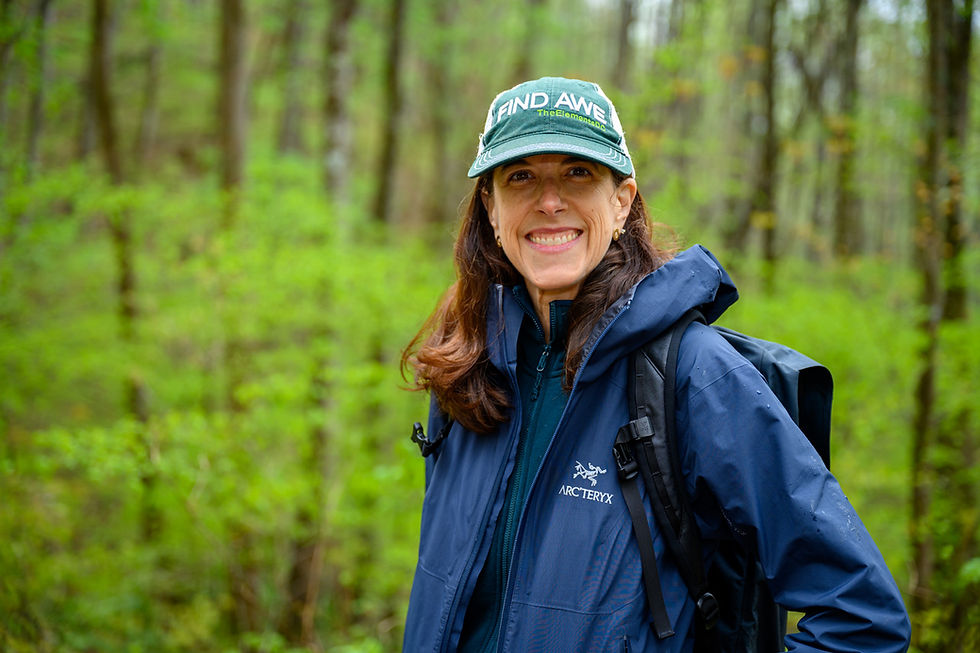Hiking and Green Exercise: A Natural Productivity Enhancer
- hikingresearch
- Jun 21, 2012
- 3 min read
The physical health benefits of green exercise such as hiking are becoming better known. Not as widely understood are the psychological impacts, particularly relating to workplace productivity and performance.

The Appalachian Trail in Grayson Highlands State Park, Virginia (USA) Photo by Mark Ellison
One of the psychological issues many people encounter working in the modern office environment is attention fatigue, which negatively impacts directed attention capacity, limiting the ability to think clearly. Attention restoration theory (Kaplan & Kaplan, 1989) describes directed attention as fragile; becoming fatigued much like a muscle that is overworked. Directed attention is fatigued by constant demands on attention, multi-tasking, and information overload from constant use of technology. This infotoxicity (Selhub & Logan, 2012) not only impairs attention capacity, but can impact mental health. Employees who are experiencing fatigued directed attention can become irritable, aggressive, and have a limited ability to analyze and plan (Kaplan, 1995). Escaping to a natural environment that offers “soft fascination” such as waterfalls, sounds of birds, or views of mountain vistas, provides opportunities to rest directed attention, allowing involuntary attention to be utilized. Involuntary attention is passive, and becomes engaged in natural settings when directed attention is rested. When directed attention is not being used, it can heal. Returning to work with a renewed ability to concentrate and focus can enhance productivity, and the quality of work completed.
Recent research has identified that three days is the optimum amount of time in nature for healing of attention capacities to occur. (Kwak-Hefferan, 2012). However, micro-restorative environments more likely to be located near the workplace can also help. Spending as little as 30 minutes walking on a greenway can have some restorative impact.
Another important benefit of time in nature is that it enhances creativity, leads to greater idea generation, and more flexible solutions to problems (Ulrich & Simons, 1986). Creativity and innovative ideas are what drive successful organizations and spur economic growth. Encouraging employees to spend time in nature, and providing opportunities to experience nature near the workplace, are an underutilized tool that can give an organization the verve it needs for growth.
An additional benefit of spending time in nature is a reduction in aggressive behaviors (Guite, et. al, 2006). Hiking in nature helps to release psychological stress and recover from stressful work situations (Ellison, 2010). Occurrences of workplace incivility continue to rise because of increased workloads and mounting stress, spawning concerns about workplace safety. Nature can serve as a balm to soothe the rising tide of anger and frustration.
There are numerous ways organizations can encourage employees to spend time in nature: offering flex time similar to Patagonia so employees can go surfing or ski the good snow; offering green space inside and outside the office such as SAS Institute which allows employees to have easy access to nature; or by offering continuing education programs that introduce the health benefits of nature that include an experiential trip such as a hike.
Organizations that embrace this approach will thrive in the 21st century knowledge economy.
References
Ellison, M. (2010). An exploratory study of the restorative benefits of hiking in wilderness solitude and the relationship to job satisfaction. Unpublished Dissertation, North Carolina State University, Raleigh.
Guite, H., Clark, C., & Ackrill, G. (2006). The impact of the physical and urban environment on mental well-being. Public Health, 120, 1117-1126.
Kaplan, S. (1995). The restorative benefits of nature: Toward an integrative framework. Journal of Environmental Psychology, 15, 169-182.
Kaplan, R., & Kaplan, S. (1989). The experience of nature: A psychological perspective. New York: Cambridge University Press.
Kwak-Hefferan, E.(2012). Hiking makes you smarter. Backpacker Magazine. May
Selhub, E. & Logan, A. (2012). Your brain on nature. Mississauga: Wiley.
Ulrich, R., & Simons, R. (1986). Recovery from stress during exposure to everyday outdoor environments. Paper presented at the Seventeenth annual conference of the environmental design research association, Atlanta, GA.
#hikingandspendingtimeinnatureincreasesproductivity #hikingreleasespsychologicalstress #greenspaceandgreenexerciseimpactingproductivity #patagoniaflexschedules #infotoxicity #naturereducingworkplaceincivility #hikingbenefits #greenexerciseandproductivity #naturereducingaggressiveness #timeinnaturehelpsgenerateideas #healthbenefitsofnatureclasses #hikingimprovesworkperformance #hikinginnatureincreasescreativity #flextime





Comments